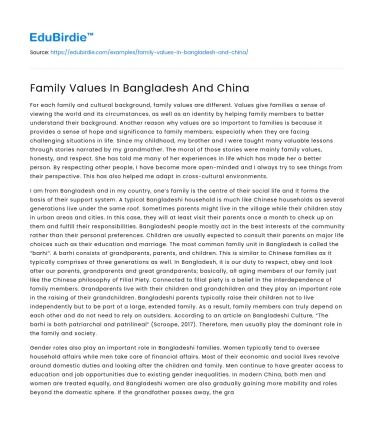For each family and cultural background, family values are different. Values give families a sense of viewing the world and its circumstances, as well as an identity by helping family members to better understand their background. Another reason why values are so important to families is because it provides a sense of hope and significance to family members; especially when they are facing challenging situations in life. Since my childhood, my brother and I were taught many valuable lessons through stories narrated by my grandmother. The moral of those stories were mainly family values, honesty, and respect. She has told me many of her experiences in life which has made her a better person. By respecting other people, I have become more open-minded and I always try to see things from their perspective. This has also helped me adapt in cross-cultural environments.
I am from Bangladesh and in my country, one’s family is the centre of their social life and it forms the basis of their support system. A typical Bangladeshi household is much like Chinese households as several generations live under the same roof. Sometimes parents might live in the village while their children stay in urban areas and cities. In this case, they will at least visit their parents once a month to check up on them and fulfill their responsibilities. Bangladeshi people mostly act in the best interests of the community rather than their personal preferences. Children are usually expected to consult their parents on major life choices such as their education and marriage. The most common family unit in Bangladesh is called the “barhi”. A barhi consists of grandparents, parents, and children. This is similar to Chinese families as it typically comprises of three generations as well. In Bangladesh, it is our duty to respect, obey and look after our parents, grandparents and great grandparents; basically, all aging members of our family just like the Chinese philosophy of Filial Piety. Connected to filial piety is a belief in the interdependence of family members. Grandparents live with their children and grandchildren and they play an important role in the raising of their grandchildren. Bangladeshi parents typically raise their children not to live independently but to be part of a large, extended family. As a result, family members can truly depend on each other and do not need to rely on outsiders. According to an article on Bangladeshi Culture, “The barhi is both patriarchal and patrilineal” (Scroope, 2017). Therefore, men usually play the dominant role in the family and society.
Gender roles also play an important role in Bangladeshi families. Women typically tend to oversee household affairs while men take care of financial affairs. Most of their economic and social lives revolve around domestic duties and looking after the children and family. Men continue to have greater access to education and job opportunities due to existing gender inequalities. In modern China, both men and women are treated equally, and Bangladeshi women are also gradually gaining more mobility and roles beyond the domestic sphere. If the grandfather passes away, the grandmother may have considerable authority within the household, but ultimately it is the patriarch who makes most decisions.
Marriage is a very sensitive issue in Bangladesh. Most marriages are arranged, and it takes place once parents decide that their child is ready for marriage. Arranged marriages used to be common in China as well. Bangladeshi parents may contact a “ghatak” (matchmaker), relatives, and friends to find an appropriate partner for their child. Similar or equal economic status, educational background, and religious beliefs are considered when arranging a marriage. However, an article on Chinese Family Values states that “In China, women are also often expected to marry men with higher social status than their own, usually someone with more money or education” (Centanni, 2018). However, this has changed in Bangladeshis as now people have more independence over whom they want to marry. Bangladesh is still a very conservative country and thus, divorce is still a social stigma. It is unusual for people to separate once they are married. The legal age to get married in Bangladesh is 18 for women however, the legal age to get married in China is 20 for women. Just like in Chinese weddings, “Red” is also a preferred colour in Bangladeshi weddings. Traditionally after marriage, the son can bring his wife and start his own family in the same house as his parents, or also has the option to get a separate house but remains under their father’s authority. Sons do not typically stay in their wife’s house after marriage. After marriage, the wife takes up her husband’s family name but is not obliged to do so. Even in China, women do not change their surname after their marriage.
To conclude, I would say that Bangladeshi and Chinese values are very similar but may differ to some extent. Family values around the world may slightly differ from one another due to differences in perspectives but these traditional family values are important because they act as the glue that holds a family together.
References
- Centanni, E. (2018, June 25). List of Chinese Family Values. Retrieved from https://classroom.synonym.com/role-of-family-in-chinese-culture-12080690.html
- Scroope, C. (2017). Bangladeshi Culture. Retrieved from https://culturalatlas.sbs.com.au/bangladeshi-culture/references-e699bfbc-f2e4-400d-9225-00c1cf871173#references-e699bfbc-f2e4-400d-9225-00c1cf871173
- Scroope, C. (2017). Chinese Culture. Retrieved from https://culturalatlas.sbs.com.au/chinese-culture/chinese-culture-family






 Stuck on your essay?
Stuck on your essay?

